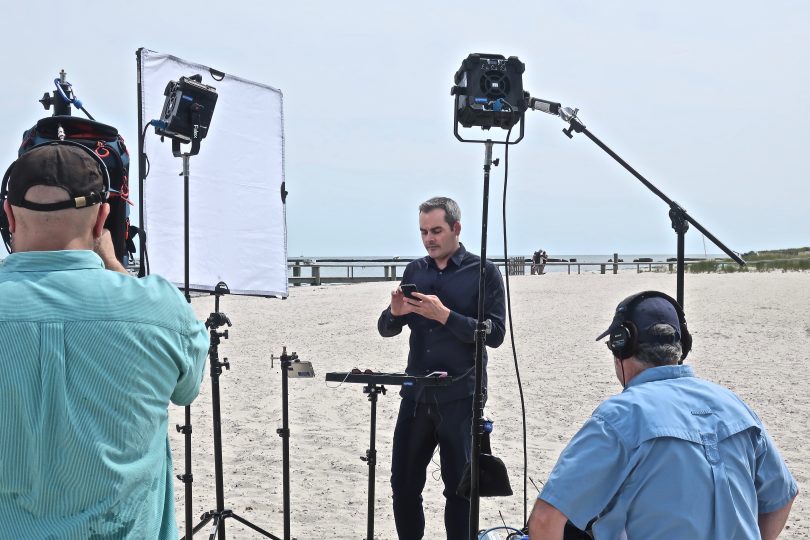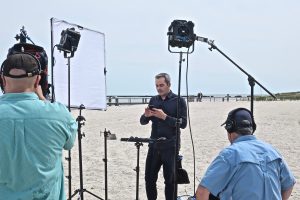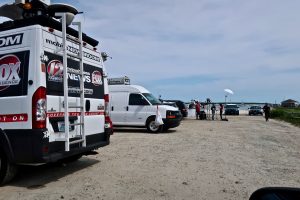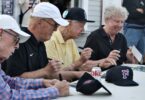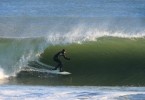HYANNIS PORT – People will watch. That was why the parking lot of the Eugenia Fortes Beach on Friday was full of TV trucks covering the sad death of a young woman, Saoirse Kennedy Hill, who happened to come from the most famous family in America.
I had zero interest in covering the tragedy. So this is the weirdest story I will ever write.
But I was curious about the circus that comes with such a thing. There was a scrum of Boston, Providence and national television crews on the beach all day Friday.
And in Hyannis, which has witnessed way too many of these media conventions on the beach for this one family, it felt, simply, sad. Overwhelmingly sad.
But among the waiting media, it seemed more tedious and friendly. Even an ice cream truck showed up, although it left before folks could order any refreshments.
I did not want to interview the media. It felt too weird. But I ended up talking to one person who allowed me to quote them if I did not identify them. I did not want to criticize the TV media either. Who am I to do such a thing?
I have a degree in Radio/TV News, but I have always been a print journalist.
I just wanted and try to understand this phenomena which I have seen many times but not on a Kennedy-esque scale.
The young woman who died was not famous. But her family was and is so famous and the storylines of tragedy in that family are so ingrained in our culture that her death is an international news story.
“It’s ghoulish,” said the television camera person I met. “We’re always here when the bad things happen.”
“We’re the last people you want to see, unlike first responders who are the first people you want to see,” said the person while hurrying up and waiting outside their big white truck with colorful lettering and numbering that indicated the identity of their employer.
This person was waiting, as were many, for the “live shot,” that TV demands. A shot with nothing happening except maybe, hopefully an update. But there they are, live from the scene.
They are there, arguably, because we, the audience, demand it.
It’s easy and completely wrong to blame the messenger or even the type of message in this case. We, the audience, want what they give us. Even this.
Especially this, apparently.
Maybe you don’t want it. Lawrence Brown, who along with his wife, Bettina, were the only non-media members who found a parking spot on beach, was going kayaking. Looking around, he said he didn’t understand the huge media contingent.
“It’s kind of disgusting,” he said. Brown, who writes a column for the Cape Cod Times and is, thus, in fact, a member of the media too, said, “I imagine the money shot for any one of these people is a crying Kennedy.”
Brown said the media should “let them grieve in peace.”
On the other hand, he said he understood the individual decisions of those who have a job to do.
And it’s a job that, apparently, ratings and thus, bosses, demand be done.
And the camera person said, “I got over the guilt feelings a long time ago.”
America has never had guilt feelings about staring at tragedy. The TV media just helps us stare because they have figured out it is what we want.
We are all guilty. I went to that beach too. You read this story.
I am not sure what we are guilty of as passive viewers of what the folks with the cameras and microphones on the beach give us night after night – the ghoulish tragedies of our times.
That is, in fact, TV news in Amcrica. Tragedy has always been news, long before television.
It always has been and it always will be. And if it has that and a degree of celebrity, there is a perfect storm of media interest great enough to fill an entire Cape Cod beach parking lot.
It has happened before on Cape Cod, at this beach. The fascination with both good and bad with this one family, seemingly more than with all others in America for more than half a century, never seems to end.
– Please like us on Facebook.

